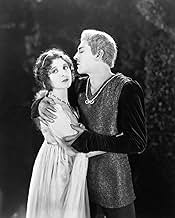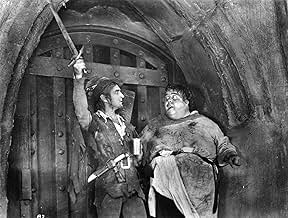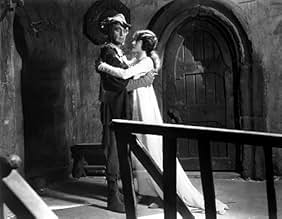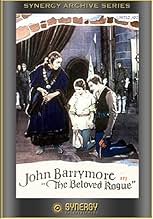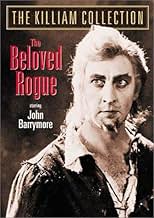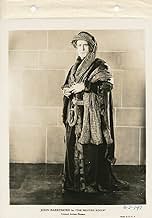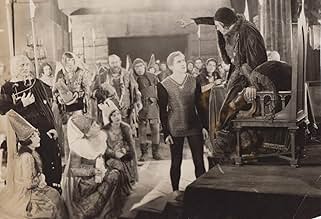Agrega una trama en tu idiomaFrançois Villon, in his lifetime the most renowned poet in France, is also a prankster, an occasional criminal, and an ardent patriot.François Villon, in his lifetime the most renowned poet in France, is also a prankster, an occasional criminal, and an ardent patriot.François Villon, in his lifetime the most renowned poet in France, is also a prankster, an occasional criminal, and an ardent patriot.
- Dirección
- Guionistas
- Elenco
Nigel De Brulier
- Astrologer
- (as Nigel de Brulier)
Otto Matieson
- Olivier
- (as Otto Mattiesen)
Tom Amandares
- Man in Crowd
- (sin créditos)
Louise Emmons
- Beggar
- (sin créditos)
Martha Franklin
- Maid
- (sin créditos)
Opiniones destacadas
8 stars as a movie, 5 as history.
I wish the movies, when based on history and actual people, are a bit more researched. The story, except a few parts goes too far away from the history. Lois XI has been shown to be blindly dependent on the astrologers his actual state-crafts and the intrigues (for which he was called spider) are totally negated. In fact his physical characteristics were made like a spider. His reforms, his bonhomie with the common men too were completely overlooked. Lois XI was historically too different and supposed to be a far better person, from the caricature that is shown.
Villon too is another historical figure, but again his life (especially the end) doesn't match with history, nor does the fate of Charles, the Duke Of Burgundy. It could have been better if he hadn't attended the ceremony since the fictionalized Count and fictionalized Charlotte's story won't have hurt the history. Of course the relation between Lois and Charles are real, as was between Villon and Lois (who had a very kind disposition towards Villon). Even the end (of Villon) isn't right, since Villon in reality had simply disappeared from public (undoubtedly dead, but as an unknown person). The only facts are Charles, Duke of Burgundy's enmity to Lois, Villon's being close and loyal to the King (Lois) and his much more than what is shown bohemian life.
If I leave the historical aspects and treat it just as a movie - not based on real people - I give it 8 stars. Merceline Day looked gorgeous, JB was of course a consummate actor, a bit theatrical on today's standard, but I have to look at the trend then and also remember it is a silent movie, so a bit of over-expression is required. Conrad as Lois XI had been creepy (as this story called for). So over all as a fiction movie it is enjoyable.
But knowing that this is as well as an historical movie, the stars go down due to blatant contradiction with facts.
Just as a footnote - I didn't know even a century back (the last scene), the population control was a hot, though not to be taken too seriously, subject.
I wish the movies, when based on history and actual people, are a bit more researched. The story, except a few parts goes too far away from the history. Lois XI has been shown to be blindly dependent on the astrologers his actual state-crafts and the intrigues (for which he was called spider) are totally negated. In fact his physical characteristics were made like a spider. His reforms, his bonhomie with the common men too were completely overlooked. Lois XI was historically too different and supposed to be a far better person, from the caricature that is shown.
Villon too is another historical figure, but again his life (especially the end) doesn't match with history, nor does the fate of Charles, the Duke Of Burgundy. It could have been better if he hadn't attended the ceremony since the fictionalized Count and fictionalized Charlotte's story won't have hurt the history. Of course the relation between Lois and Charles are real, as was between Villon and Lois (who had a very kind disposition towards Villon). Even the end (of Villon) isn't right, since Villon in reality had simply disappeared from public (undoubtedly dead, but as an unknown person). The only facts are Charles, Duke of Burgundy's enmity to Lois, Villon's being close and loyal to the King (Lois) and his much more than what is shown bohemian life.
If I leave the historical aspects and treat it just as a movie - not based on real people - I give it 8 stars. Merceline Day looked gorgeous, JB was of course a consummate actor, a bit theatrical on today's standard, but I have to look at the trend then and also remember it is a silent movie, so a bit of over-expression is required. Conrad as Lois XI had been creepy (as this story called for). So over all as a fiction movie it is enjoyable.
But knowing that this is as well as an historical movie, the stars go down due to blatant contradiction with facts.
Just as a footnote - I didn't know even a century back (the last scene), the population control was a hot, though not to be taken too seriously, subject.
This film is a good start for novices that have never watched a 'Silent Film' and for those who believe that quality Cinema started with their generations efforts. They are doing a disservice to themselves by not expanding their horizons. The 'Silent Film' is a art-form of acting in pantomime that is different from the sound film and the stage, it can stands on it's own merits.
THE BELOVED ROGUE (1927) United Artists is a fictionalized history of the relationship of French Poet 'Francois Villon' and 'King Louis XI'. Through 'Villons' prodding 'King Louis' will defeat his nemesis 'Duke of Burgandy' minimize the Feudal System and establish the KING as head of the State and the beginnings of modern France.
The cast is exceptional, lead by JOHN BARRYMORE (yes, Drew's GrandFather). For those who only remember him for the decaying actor 'Larry Renault' in DINNER AT EIGHT (1933) or the ham in THE INVISABLE WOMEN (1940) this will be a revelation. Fit, trim with the 'Great Profile' still in evidence he commands the screen. Co-Starring in his first American film is CONRAD VEIDT with his 'cadaverous spider' interpretation of 'Louis XI'. This is a duel of acting titans, each not giving the other a inch. On a trivia note is Character Actor and Dwarf ANGELO ROSSITTO in his first film, his last, MAD MAX BEYOND THUNDERDOME (1985). There are other character actors who would continue in sound that are easily picked up on.
United Artists spared no expense in this handsome production supervised by WILLIAM CAMERON MENZIES. Costumes, Props and Sets are well done and not exaggerated like in a DOUGLAS FAIRBANKS productions. There is a touch of reality here. The copy on DVD that we watched from 'Delta Entertainment' came from a good master. Though not 'restored' its musical soundtrack was clear and the print only suffered from nuisance black-spots (dirt) and drop-outs. The only major damage at the end of the last reel from water. 'Kino' also has a edition which may be of a better quality since they do major restorations on their prints. Best check with them. In our opinion this is a 'must have' particularly if you have no 'silents' in your collection. This is a good place to start.
THE BELOVED ROGUE (1927) United Artists is a fictionalized history of the relationship of French Poet 'Francois Villon' and 'King Louis XI'. Through 'Villons' prodding 'King Louis' will defeat his nemesis 'Duke of Burgandy' minimize the Feudal System and establish the KING as head of the State and the beginnings of modern France.
The cast is exceptional, lead by JOHN BARRYMORE (yes, Drew's GrandFather). For those who only remember him for the decaying actor 'Larry Renault' in DINNER AT EIGHT (1933) or the ham in THE INVISABLE WOMEN (1940) this will be a revelation. Fit, trim with the 'Great Profile' still in evidence he commands the screen. Co-Starring in his first American film is CONRAD VEIDT with his 'cadaverous spider' interpretation of 'Louis XI'. This is a duel of acting titans, each not giving the other a inch. On a trivia note is Character Actor and Dwarf ANGELO ROSSITTO in his first film, his last, MAD MAX BEYOND THUNDERDOME (1985). There are other character actors who would continue in sound that are easily picked up on.
United Artists spared no expense in this handsome production supervised by WILLIAM CAMERON MENZIES. Costumes, Props and Sets are well done and not exaggerated like in a DOUGLAS FAIRBANKS productions. There is a touch of reality here. The copy on DVD that we watched from 'Delta Entertainment' came from a good master. Though not 'restored' its musical soundtrack was clear and the print only suffered from nuisance black-spots (dirt) and drop-outs. The only major damage at the end of the last reel from water. 'Kino' also has a edition which may be of a better quality since they do major restorations on their prints. Best check with them. In our opinion this is a 'must have' particularly if you have no 'silents' in your collection. This is a good place to start.
Besides being entertaining in itself, with plenty of action, wit, and more, this feature gives John Barrymore an excellent role that plays to his strengths and that gives him a lot of good material to work with. Barrymore's vigorous style works well in the role, and he has many opportunities for drama, humor, and romance.
The story is based very loosely on the life of the 15th century French poet François Villon, but it really only uses the character and the basics of the historical setting. The character that the script creates, though, is not only a great role for Barrymore, but is well-conceived as a movie character. And if Barrymore's entertaining portrayal of Villon, fanciful though it is, encourages anyone to find out more about the historical Villon, so much the better.
(The real Villon was both a worse criminal and a better poet than the movie suggests. A number of his crimes were truly harmful offenses, rather than the impish pranks that he plays in the movie. At the same time, his poetry was quite a bit deeper than is suggested by the occasional light verses in the inter-titles.)
Conrad Veidt is cast as King Louis XI, Villon's sometime friend and sometimes persecutor. Veidt gives a really good turn to the character, using his physical posture and mannerisms to suggest the king's complex character.
There are a number of good sequences that are sheer entertainment, such as the catapult scene and Villon's first visit to Charlotte's palace, and that are rather impressive on the production end too. The story as a whole is the best kind of historical melodrama, with numerous turns of fortune and plenty going on.
The story is based very loosely on the life of the 15th century French poet François Villon, but it really only uses the character and the basics of the historical setting. The character that the script creates, though, is not only a great role for Barrymore, but is well-conceived as a movie character. And if Barrymore's entertaining portrayal of Villon, fanciful though it is, encourages anyone to find out more about the historical Villon, so much the better.
(The real Villon was both a worse criminal and a better poet than the movie suggests. A number of his crimes were truly harmful offenses, rather than the impish pranks that he plays in the movie. At the same time, his poetry was quite a bit deeper than is suggested by the occasional light verses in the inter-titles.)
Conrad Veidt is cast as King Louis XI, Villon's sometime friend and sometimes persecutor. Veidt gives a really good turn to the character, using his physical posture and mannerisms to suggest the king's complex character.
There are a number of good sequences that are sheer entertainment, such as the catapult scene and Villon's first visit to Charlotte's palace, and that are rather impressive on the production end too. The story as a whole is the best kind of historical melodrama, with numerous turns of fortune and plenty going on.
Along with DR JEKYLL & MR HYDE, this 1927 action/adventure flick remains one of the best John Barrymore silent vehicles currently available to us. Here "The Great Profile" invades Douglas Fairbanks territory and more than holds his own. There is so much to like about this film that it's hard to know where to begin. Aside from Barrymore's charismatic performance there is the American debut of Conrad Veidt. Just observe his body posture as Louis XI and you'll see what silent screen acting is all about.
Then there is the opportunity to see Mack Swain away from Chaplin and Sennett. The sets by William Cameron Menzies are staggering and the camera work by Joseph August is among the finest in silent film. It was all brought together by Alan Crosland who is best remembered for directing THE JAZZ SINGER although this picture was much more typical of his style.
The print utilized for this DVD is taken from the Killiam Collection and is the same as the one issued by Image Entertainment in 2002. Although it's a little worn in places, the new transfer has better picture quality with the tinted scenes toned down compared to the old Image version.
The William Perry piano score, while not in state of the art sound, has been enhanced and is a great improvement over the previous release. It remains a good example of what a silent piano score should be. A rare opportunity to see John Barrymore in his prime with many other things to savor. It still excites the senses after all these years...For more reviews visit The Capsule Critic.
UPDATE 2024: A 35mm print was recently discovered in the Library of Congress. It has been restored and is a significant improvement over the old Killiam print which had numerous issues. The orchestral score by Robert Israel easily supplants the old William Perry piano score. It's currently available on Blu-ray from Kino.
Then there is the opportunity to see Mack Swain away from Chaplin and Sennett. The sets by William Cameron Menzies are staggering and the camera work by Joseph August is among the finest in silent film. It was all brought together by Alan Crosland who is best remembered for directing THE JAZZ SINGER although this picture was much more typical of his style.
The print utilized for this DVD is taken from the Killiam Collection and is the same as the one issued by Image Entertainment in 2002. Although it's a little worn in places, the new transfer has better picture quality with the tinted scenes toned down compared to the old Image version.
The William Perry piano score, while not in state of the art sound, has been enhanced and is a great improvement over the previous release. It remains a good example of what a silent piano score should be. A rare opportunity to see John Barrymore in his prime with many other things to savor. It still excites the senses after all these years...For more reviews visit The Capsule Critic.
UPDATE 2024: A 35mm print was recently discovered in the Library of Congress. It has been restored and is a significant improvement over the old Killiam print which had numerous issues. The orchestral score by Robert Israel easily supplants the old William Perry piano score. It's currently available on Blu-ray from Kino.
And nothing wrong in that! Heartily endorse the comments of boblipton and Snow Leopard.
I'm thrilled to find this movie is available on US DVD - I've only ever seen it through once - I persuaded the Goethe Institute here in London to show it in their Conrad Veidt season some years ago - and long to see it again.
Barrymore is resplendent when engaged, as in this movie, possibly because of the prick of having a renowned German actor as a foil. And Veidt is such a wonderful scene stealer (doesn't he pick his nose at one point?) This is one of the seminal films to connect 'Dr Jekyll' with '20th Century', 'Grand Hotel' or 'Midnight'; and 'The Cabinet of Dr Caligari' or 'The Student of Prague' with 'The Spy in Bladk', 'Contraband' and 'Casablanca'.
See it!
I'm thrilled to find this movie is available on US DVD - I've only ever seen it through once - I persuaded the Goethe Institute here in London to show it in their Conrad Veidt season some years ago - and long to see it again.
Barrymore is resplendent when engaged, as in this movie, possibly because of the prick of having a renowned German actor as a foil. And Veidt is such a wonderful scene stealer (doesn't he pick his nose at one point?) This is one of the seminal films to connect 'Dr Jekyll' with '20th Century', 'Grand Hotel' or 'Midnight'; and 'The Cabinet of Dr Caligari' or 'The Student of Prague' with 'The Spy in Bladk', 'Contraband' and 'Casablanca'.
See it!
¿Sabías que…?
- TriviaThis film was considered lost for many years until a copy, with the original tinting, was found in the late 1960s in the personal archive of Mary Pickford.
- ErroresWhen François and others leave the King's presence, they turn and walk away. It was forbidden for any to show their back to the King; they should have departed by backing away until they were out of his sight.
- Citas
François Villon: Happy is Paris, where fools reign once a year - while everywhere else the fools reign all the time!
- ConexionesFeatured in Hollywood (1980)
Selecciones populares
Inicia sesión para calificar y agrega a la lista de videos para obtener recomendaciones personalizadas
Detalles
- Tiempo de ejecución1 hora 39 minutos
- Relación de aspecto
- 1.33 : 1
Contribuir a esta página
Sugiere una edición o agrega el contenido que falta

Principales brechas de datos
By what name was The Beloved Rogue (1927) officially released in India in English?
Responda

